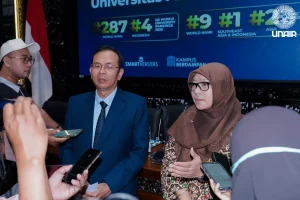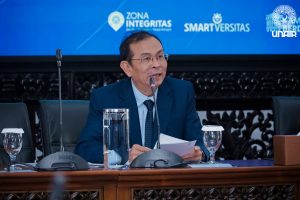UNAIR NEWS – UNAIR Faculty of Law (FH) held a studium generale in Building A FH UNAIR on Saturday morning, June 4, 2022. Director-General of the Asia Pacific and African Affairs of Indonesian Foreign Ministry Abdul Kadir Jailani was present as the guest speaker to discuss the ASEAN dispute settlement mechanism (DSM).
The premise of the lecture presented by Abdul was critical notes about DSM in ASEAN. He stated that the mechanism is not quite progressive and confusing. DSM in ASEAN is classified into four categories, dispute mechanism on ASEAN instruments; dispute mechanism on non-ASEAN instruments; mechanism on economic agreement disputes; and dispute mechanisms related to the interpretation of the ASEAN Charter and other ASEAN instruments.
“The problem is that there are no clear definitions of ASEAN instruments. It has been clarified that ASEAN’s instruments are agreements made by ASEAN members in their capacity as ASEAN members. How about ASEAN member agreements involving non-ASEAN countries? Can it be called an ASEAN instrument or not? There is legal uncertainty there,” said the Faculty of Law alumnus.
Abdul also criticized the ASEAN DSM system that provides different and mutually exclusive dispute settlements with no specific reason for the law (ratio legis). It makes DSM in ASEAN a complex and multilayered system, something that should not be the case in the legal system.
“In practice, DSM has never been used by ASEAN countries. This reluctance is rooted in its unpredictable system, while predictability is one of the requirements in a legal system,” said the former Indonesian Ambassador to Canada.
One aspect to consider, Abdul added, is the ASEAN way as a culture of law. ASEAN countries tend to avoid law disputes and prioritize dialogue. ASEAN countries eventually will have a dispute, the DSM mechanism is not used as they resolve it through the World Trade Organization (WTO).
“The nonlegal approach also creates a problem in the DSM system development in ASEAN. In the future, the system update should emphasize predictability and stability to solve institutional problems. ASEAN has very promising potential and future. Therefore, it should be supported with a rule-based or legalistic approach,” he ended.
Author: Pradnya Wicaksana
Editor: Nuri Hermawan









